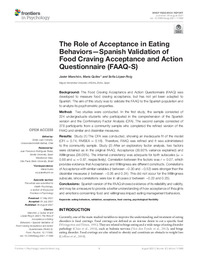Please use this identifier to cite or link to this item:
https://hdl.handle.net/11000/35118Full metadata record
| DC Field | Value | Language |
|---|---|---|
| dc.contributor.author | Manchón, Javier | - |
| dc.contributor.author | Quiles, Maria Jose | - |
| dc.contributor.author | López Roig, Sofía | - |
| dc.contributor.other | Departamentos de la UMH::Ciencias del Comportamiento y salud | es_ES |
| dc.date.accessioned | 2025-01-22T08:29:56Z | - |
| dc.date.available | 2025-01-22T08:29:56Z | - |
| dc.date.created | 2021-08 | - |
| dc.identifier.citation | Front. Psychol. 12 (2021) | es_ES |
| dc.identifier.issn | 1664-1078 | - |
| dc.identifier.uri | https://hdl.handle.net/11000/35118 | - |
| dc.description.abstract | Background: The Food Craving Acceptance and Action Questionnaire (FAAQ) was developed to measure food craving acceptance, but has not yet been adapted to Spanish. The aim of this study was to validate the FAAQ to the Spanish population and to analyze its psychometric properties. Edited by: Emilio Juan Compte, Universidad Adolfo Ibáñez, Chile Reviewed by: Juan Francisco Rodríguez-Testal, Sevilla University, Spain Wanderson Silva, São Paulo State University, Brazil *Correspondence: Maria Quiles mj.quiles@umh.es Specialty section: This article was submitted to Health Psychology, a section of the journal Frontiers in Psychology Received: 31 May 2021 Accepted: 05 July 2021 Published: 09 August 2021 Citation: Manchón J, Quiles M and López-Roig S (2021) The Role of Acceptance in Eating Behaviors—Spanish Validation of Food Craving Acceptance and Action Questionnaire (FAAQ-S). Front. Psychol. 12:717886. doi: 10.3389/fpsyg.2021.717886 Method: Two studies were conducted. In the first study, the sample consisted of 224 undergraduate students who participated in the comprehension of the Spanish version and the Confirmatory Factor Analysis (CFA). The second sample consisted of 378 participants from a community sample who completed the refined version of the FAAQ and similar and dissimilar measures. Results: Study (1) The CFA was conducted, showing an inadequate fit of the model (CFI = 0.74, RMSEA = 0.18). Therefore, FAAQ was refined and it was administered to the community sample. Study (2) After an exploratory factor analysis, two factors were obtained as in the original FAAQ, Acceptance (30.92% variance explained) and Willingness (36.05%). The internal consistency was adequate for both subscales (ω = 0.88 and ω = 0.87, respectively). Correlation between the factors was r = 0.07, which provides evidence that Acceptance and Willingness are different constructs. Correlations of Acceptance with similar variables (r between −0.30 and −0.52) were stronger than the dissimilar measures (r between −0.26 and 0.24). This did not occur for the Willingness subscale, since correlations were low in all cases (r between −0.22 and 0.25). Conclusions: Spanishversion of the FAAQshowedevidenceofitsreliability and validity, and maybeameasuretoprovideabetter understanding of how acceptance of thoughts and emotions concerning food and willingness impact eating management behaviors. | es_ES |
| dc.format | application/pdf | es_ES |
| dc.format.extent | 8 | es_ES |
| dc.language.iso | eng | es_ES |
| dc.publisher | Frontiers Media | es_ES |
| dc.rights | info:eu-repo/semantics/openAccess | es_ES |
| dc.rights | Attribution-NonCommercial-NoDerivatives 4.0 Internacional | * |
| dc.rights.uri | http://creativecommons.org/licenses/by-nc-nd/4.0/ | * |
| dc.subject | eating behaviors | es_ES |
| dc.subject | validation | es_ES |
| dc.subject | acceptance | es_ES |
| dc.subject | food craving | es_ES |
| dc.subject | psychological flexibility | es_ES |
| dc.subject.other | CDU::6 - Ciencias aplicadas::60 - Cuestiones generales de las ciencias aplicadas | es_ES |
| dc.title | The Role of Acceptance in Eating Behaviors—Spanish Validation of Food Craving Acceptance and Action Questionnaire (FAAQ-S) | es_ES |
| dc.type | info:eu-repo/semantics/article | es_ES |
| dc.relation.publisherversion | https://doi.org/10.3389/fpsyg.2021.717886 | es_ES |

View/Open:
fpsyg-12-717886 (1).pdf
228,14 kB
Adobe PDF
Share:
.png)
